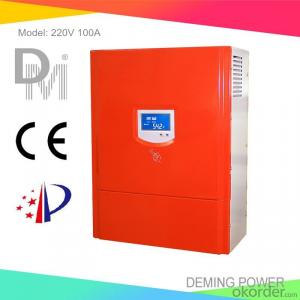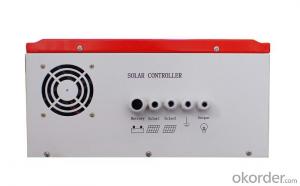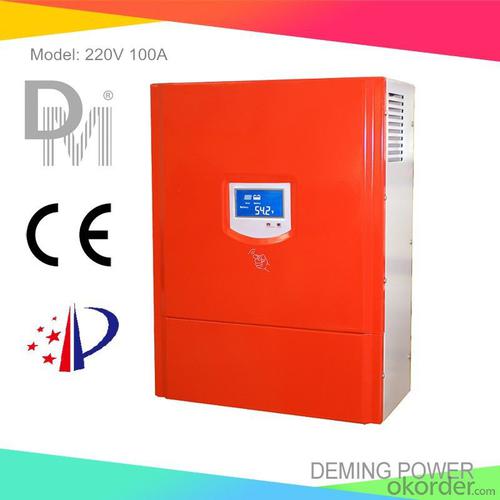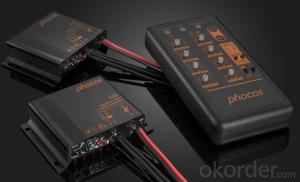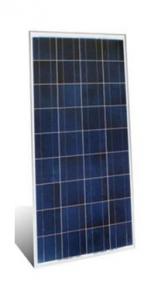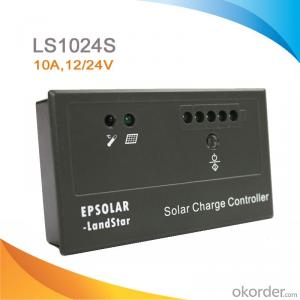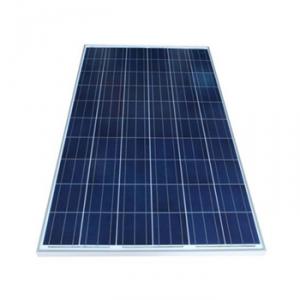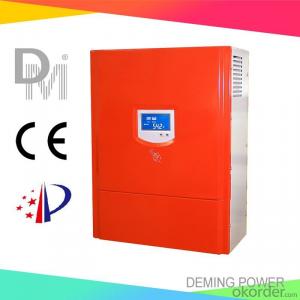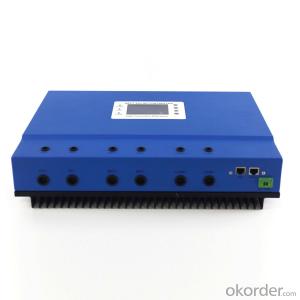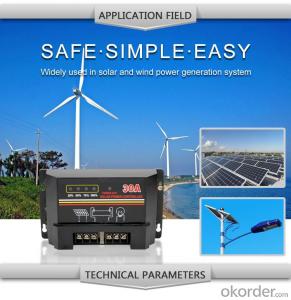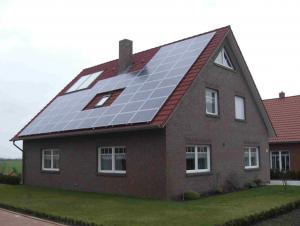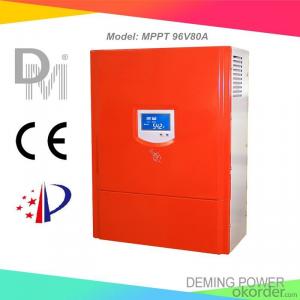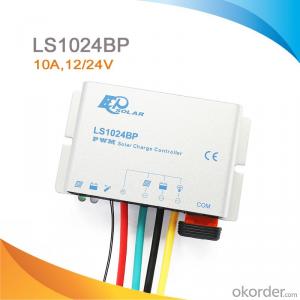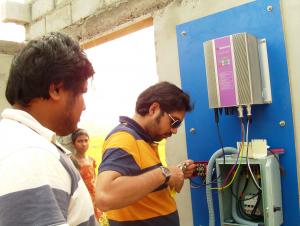Mastervolt Solar Charge Controller 220V 100A - Best Price for Solar Power System
- Loading Port:
- Qingdao
- Payment Terms:
- TT OR LC
- Min Order Qty:
- 1 PCS
- Supply Capability:
- 500 PCS/month
OKorder Service Pledge
OKorder Financial Service
You Might Also Like
Properties of the solar charge controller
1. Design for off-grid solar power system.
2. Applicable to different kinds of batteries.
3. Modular design with simple structure and easy maintenance.
4. Automatic power control function.
5. LCD display: Solar panel current, solar panel voltage, solar panel power, battery group voltage, charge current.
6. Perfect protection function: Solar reverse charge protection, Solar reverse connection protection, Battery reverse connection protection, Battery overcharge protection, Battery over current protection etc ,thus the system has higher reliability.
Technical parameters of the solar charge controller
Model | 220V100A |
Battery group rated voltage | 220Vdc |
PV open circuit voltage(Vdc) | 500V |
PV Rated current | 100A |
PV Max. power | 22000Wp |
Input DC Voltage Range(Vdc) | 175-260Vdc |
Input PV module road number | 2 |
Function | Auto stop charge, auto recharge voltage; Protection: connecting contrary, over current, short circuit, over heat etc. |
Display mode | LCD |
Display content | solar panel voltage, solar panel current, solar panel power, battery voltage, charge current |
Floating Charge Voltage (adjustable) | 248Vdc |
Stop charge voltage | 260Vdc |
Recharge voltage | 243Vdc |
Voltage drop between PV and battery | 1.5V |
Max itself power consumption | 100mA-150mA |
Work environment temperature | -30-60°C |
Relative humidity | <90% No condensation |
Applicable altitude | <3000m The rated power should be reduced when it is higher than 2000m |
Noise (1m) | <40dB |
Degree of protection | IP20(Indoor) |
Cooling method | Forced air cooling |
*Communication interface (optional) | RS485/USB/GPRS/Ethernet |
*Temperature compensation(optional) | -4mv/°C/2V,-35°C~+80°C,Accuracy:±1°C |
Package size (mm) | Wood case, 750*380*590mm |
Package Weight(kg) | 36Kg |
*Above parameter only for reference. Could be custom made to user specifications.
- Q: Can a solar controller be used with a solar-powered medical equipment system?
- Yes, a solar controller can be used with a solar-powered medical equipment system. A solar controller helps regulate the voltage and current from the solar panels to ensure the batteries are charged properly and the equipment receives a steady power supply. It helps optimize the performance and efficiency of the solar system, making it suitable for powering medical equipment.
- Q: Can a solar controller be used with solar panels that are connected to a solar heating system?
- Yes, a solar controller can be used with solar panels that are connected to a solar heating system. A solar controller is responsible for regulating and optimizing the flow of energy between the solar panels and the system they are connected to. In the case of a solar heating system, the controller will monitor the temperature of the system and adjust the flow of energy accordingly to maintain the desired temperature. This helps to maximize the efficiency and effectiveness of the solar heating system. Therefore, a solar controller is an essential component that can be used in conjunction with solar panels connected to a solar heating system.
- Q: Can a solar controller be used with solar panels that are connected to a micro-inverter?
- Yes, a solar controller can be used with solar panels that are connected to a micro-inverter. The solar controller regulates the charging and discharging of the batteries, while the micro-inverter converts the DC power produced by the solar panels into AC power for use in the home or to be fed back into the electrical grid.
- Q: Can a solar controller be used with a solar-powered electric vehicle charging station?
- Yes, a solar controller can be used with a solar-powered electric vehicle charging station. The solar controller helps regulate and optimize the charging process by managing the flow of electricity from the solar panels to the charging station. This ensures efficient utilization of solar energy and protects the charging station and the electric vehicle from overcharging or voltage fluctuations.
- Q: What is the purpose of the battery deep discharge protection feature on a solar controller?
- The purpose of the battery deep discharge protection feature on a solar controller is to prevent the battery from being discharged below a safe level. This feature helps to prolong the battery's lifespan and prevent damage to the battery cells. It also ensures that there is always enough charge remaining in the battery to power the connected devices or appliances.
- Q: What is the display type of a solar controller?
- The display type of a solar controller is typically an LCD (Liquid Crystal Display) screen.
- Q: Can a solar controller be used with solar-powered electric fences for livestock?
- Indeed, a solar controller is compatible with solar-powered electric fences designed for livestock. Serving as a vital element within a solar-powered electric fence setup, the solar controller effectively manages the power distribution from the solar panel to the fence energizer. Its primary function is to guarantee efficient charging of the battery and the seamless operation of the fence. Additionally, the solar controller plays a crucial role in safeguarding the battery against overcharging, thus extending its lifespan. Consequently, utilizing a solar controller alongside a solar-powered electric fence for livestock is strongly advised to ensure the system's utmost performance and sustainability.
- Q: Can a solar controller be used with solar-powered indoor commercial buildings?
- Yes, a solar controller can be used with solar-powered indoor commercial buildings. A solar controller is a device that regulates the flow of electrical energy between the solar panels and the battery or grid. It helps manage the charging process, prevent overcharging or discharging of batteries, and optimize the energy output from the solar panels. In the case of solar-powered indoor commercial buildings, the solar controller plays a crucial role in ensuring that the solar energy generated is efficiently utilized to power the electrical systems and equipment. It helps manage the energy flow, store excess energy in batteries for later use, and handle the connection to the grid if needed. Additionally, a solar controller can provide valuable data and monitoring capabilities, allowing building owners or operators to track and analyze the energy production and consumption patterns. This information can be used to optimize the energy usage, identify areas of improvement, and potentially reduce energy costs. Overall, a solar controller is an essential component of a solar-powered indoor commercial building, as it helps regulate and optimize the energy flow, ensuring efficient and reliable operation of the electrical systems.
- Q: What is the purpose of the load output on a solar controller?
- The load output on a solar controller serves the purpose of supplying power to a connected load, such as lights or small appliances, directly from the battery of the solar panel system. This feature allows for the utilization of solar energy when the sun is not shining or when the solar panel system cannot generate sufficient power to meet the load requirements. By directly connecting the load to the battery, the solar controller ensures a consistent and stable power supply to the load, thus maximizing the efficiency and reliability of the solar system. Moreover, the load output often incorporates various protection features, including overcurrent and overvoltage protection, to safeguard the connected load from potential damage. In summary, the load output on a solar controller enhances the functionality and versatility of a solar panel system by enabling the utilization of solar energy even in less favorable conditions for power generation.
- Q: What is the maximum load power of a solar controller?
- The solar controller has a maximum load power, which indicates the highest power it can handle and deliver to connected loads. The manufacturer usually specifies the load power capacity of the solar controller, which depends on its model and design. When designing and configuring a solar power system, it is crucial to consider the maximum load power capacity of the solar controller. Going beyond this capacity can lead to overheating, controller damage, and potential failure of the connected loads. When choosing a solar controller, it is vital to ensure that its maximum load power capacity meets or surpasses the power requirements of the connected loads. If the load power requirements exceed the capacity of a single solar controller, it may be necessary to use multiple controllers or upgrade to a higher-capacity controller to ensure optimal performance and system reliability.
Send your message to us
Mastervolt Solar Charge Controller 220V 100A - Best Price for Solar Power System
- Loading Port:
- Qingdao
- Payment Terms:
- TT OR LC
- Min Order Qty:
- 1 PCS
- Supply Capability:
- 500 PCS/month
OKorder Service Pledge
OKorder Financial Service
Similar products
Hot products
Hot Searches
Related keywords
